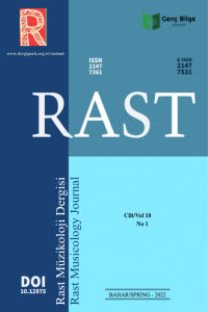İlkokul düzeyinde etkin müzik öğretim yöntemlerinin analizi: Rusya örneği
müzik eğitimi, modern çocuklara öğretme sorunları, bilişsel aktivitenin aktivasyonu, öğrenme ve yaratıcı aktivite
Analysis of research on active music teaching at primary education: The case of Russia
music education, problems of teaching modern children, activation of cognitive activity, learning and creative activity,
___
- Aksenova, S.S, Kruglova, M.G., Ovsyannikova, V.A., Pereverzeva, M.V., Smirnov, A.V. (2020). Musical hermeneutics, semantics, and semiotics. Journal of Advanced Research in Dynamical and Control Systems, 12(S3), 779–784.
- Bezborodova, L.A. (2018). Teoreticheskie i prakticheskie osnovy proektirovaniya protsessa muzykalnogo obrazovaniya mladshikh shkolnikov [Theoretical and practical foundations for designing the process of musical education for children in elementary schools]. Moscow: Izdatelstvo MPGU, 210 p.
- Blednykh, O.I. (2014). Aktivnye metody obucheniya [Active education methods]. Problemy sovremennoi nauki i obrazovaniya, 4(57), 117–119.
- Erosh, N.V. (2011). Metody i priemy razvitiya tvorcheskoi aktivnosti uchashchikhsya nachalnoi shkoly [Methods and techniques for promoting creative activiry in children in primary schools]. Internet-zhurnal "Eidos", 11, 45–49.
- Kalinina, G.F. (2003). Igry na urokakh muzykalnoi literatury [Games in musical literature classes]. Moscow: Izdatelstvo V.V. Kalinin, 16 p.
- Khutorskoi, A.V. (2005). Pedagogicheskaya innovatika: metodologiya, teoriya, praktika [Pedagogical innovation: methodology, theory, practice]: Academic publication. Moscow: Izd-vo UNTs DO, 222 p.
- Lysykh, Ya.A., Pak, N.I. (2012). Diagnostika vospriyatiya uchebnoi informatsii, predstavlennoi, raznymi sposobami [Diagnostics of perception of educational information presented in different ways]. Aktualnye problemy aviatsii i kosmonavtiki, 2(8), 481–482.
- Morozova, E.A., Pereverzeva, M.V. (2019). Igrovaya deyatelnost v protsesse priobshcheniya detei k muzykalnomu folkloru [Game activity in the process of introducing children to musical folklore]. Uchenye zapiski RGSU, 18(1(150)), 142–149.
- Morozova, N.V. (2017). O razvitii obraznogo myshleniya shkolnikov v protsesse muzykalnogo obrazovaniya [On the development of imaginative thinking of school students in the process of music education]. Muzykalnoe iskusstvo i obrazovanie, 4, 28–44.
- Nevzorova, A.V., Semenov, A.A. (2020). Razvitie poznavatelnykh universalnykh uchebnykh deistvii v protsesse muzykalnogo obrazovaniya shkolnikov [Development of cognitive universal learning actions in the process of music education of schoolchildren]. Yaroslavskii psikhologicheskii Vestnik, 2(47), 39–43.
- Ostapenko, T.V. (2020). Metody i priemy aktivnogo slushaniya na uroke muzyki v nachalnykh klassakh [Methods and techniques of active listening in the music lesson in primary school]. In: G.Yu. Gulyaev (Ede.), Nauchnye issledovaniya molodykh uchenykh: proceedings of the 7th International scientific and practical conference, January 17, 2020, Penza, Russia (pp. 137-141). Penza: Nauka i Prosveshcheniye.
- Pereverzeva, M.V., Anufrieva, N.I., Avramkova, I.S., Kuznetsova, E.O., Shcherbakova, A.I. (2020a). Game technologies in the process of mastering of theoretical musical disciplines. Revista Inclusiones, 7(2), 185–194.
- Pereverzeva, M.V., Anufrieva, N.I., Kats, M.L., Kazakova, I.S., Umerkaeva, S.S. (2020b). Interdisciplinary approach to the mastering of the music of the 20th century. Journal of Advanced Research in Dynamical and Control Systems, 12(S3), 772–778.
- Rigina, G.S. (1982). Tipologiya improvizatsionnykh zadanii v nachalnoi shkole [Typology of improvisational tasks in primary school]. In: Yu.B. Aliev, V.K. Beloborodova, P. Morozova, et al. (Eds.), Razvitie muzykalnogo slukha, pevcheskogo golosa i muzykalno-tvorcheskikh sposobnostei uchashchikhsya obshcheobrazovatelnoi shkoly [Development of musical ear training, singing voice and musical and creative abilities in general education schools] (pp. 225-228). Moscow: Prosveshchenie.
- Sergeeva, G.P. (2013). Osvoenie tekhnologii prepodavaniya predmeta "Muzyka" v poslediplomnom obrazovanii [Mastering the technologies of teaching the subject "Music" in postgraduate education]: a monograph. Moscow: Triumf, 264 p.
- Shlykova, I.V. (2016). Innovatsii na urokakh muzyki v mladshikh klassakh obshcheobrazovatelnoi shkoly [Innovations at music lessons in primary general education school]. Analitika kulturologii, 1(34), 94–101.
- Shoniya, N.T. (2017). Interaktivnyi sposob doneseniya informatsii kak instrument obespecheniya effektivnosti vospriyatiya [Interactive method of getting information across as an instrument of ensuring efficient perception]. Teoriya i praktika sovremennoi nauki, 12(30), 795–799.
- Suslova, N.V. (2015). Shkolnyi uchebnik po muzyke: etapy evolyutsii [School textbook on music: stages of evolution]. Muzykalnoe iskusstvo i obrazovanie, 3, 159–170.
- Toropova, A.V. (2016). Muzykalnaya psikhologiya i psikhologiya muzykalnogo obrazovaniya [Musical psychology and psychology of music educaiton]: Uchebnik dlya bakalavriata i magistratury [Textbook for bachelor and master students]. 4th edition, updated and amended. Moscow: Yurait, 246 p.
- Vakhrusheva, T.Yu. (2008). Teoreticheskie aspekty aktivnykh metodov obucheniya [Theoretical aspects of active education methods]. Pedagogy of Physical Culture and Sports, 3, 36–41.
- ISSN: 2147-7361
- Yayın Aralığı: Yılda 4 Sayı
- Başlangıç: 2013
- Yayıncı: Genç Bilge Yayıncılık (Young Wise)
Kateryna NEMCHENKO, Larisa LOBODA, Anatoliy NOSULYA, Olena KUCHMA
Türkiye popüler müziğinin salt müziksel eğilimleri 2007-2017
Onur KARABİBER, Songül KARAHASANOĞLU, Elif YAVUZ
Teaching pop vocal performance to students: A comparison of methods used in Russia
Natalia ANUFRİEVA, Semyon LİMANOV, Yana MAMONOVA, Natalia ANCHUTİNA, Maria Kats KATS
Emotional expressiveness of the vocalist: a cross-sectional study
Alina SHPYRKA, Larysa BONDARENKO, Ganna KONDRATENKO, Alexandr SHPYRKA
Kira MAİDENBERG-TODOROVA, Olena KHOROSHAVİNA, Inna HODİNA, Olga VORONOVSKAYA
Kateryna NEMCHENKO, Larisa LOBODA, Anatoliy NOSULYA, Olena KUCHMA
Yeni kaynaklar ışığında yeni bir Rauf Yekta Bey biyografisi
Duygu TAŞDELEN, Nilgün DOĞRUSÖZ DİŞİAÇIK
İlkokul düzeyinde etkin müzik öğretim yöntemlerinin analizi: Rusya örneği
Marina PEREVERZEVA, Natalia ANUFRİEVA, Anna SHCHERBAKOVA, Elena KUZNETSOVA, Alena ZHARKOVA
Expressive piano technic: basics of healthy movement, technic and interpretation
Nevbet-i Müretteb’in farklı coğrafyalardaki izleri üzerine bir inceleme
